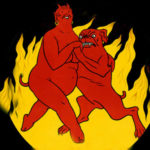We run our website the way we wished the whole internet worked: we provide high quality original content with no ads. We are funded solely by your direct support. Please consider supporting this project.

That Weird Episode with the Pigs
In my opinion, the single strangest episode recounted in the Gospels is the account of Jesus’ encounter with a demonized man that ended with two thousand pigs drowning themselves in the Sea of Galilee (Mk 5:1-10//Mt 8:28-34; Lk 8:26-39). Some find it morally objectionable that this mass suicide was the result of Jesus allowing the multitude of demons that possessed this man to enter into them. Does this story present Jesus as someone who evidenced a callous disregard for the welfare of these animals?
This episode must be understood in the context of the cosmic battle that Jesus was involved in throughout his ministry. It is significant that, as Jesus and his disciples crossed the Sea of Galilee to come to this Gentile region, they were confronted with a life-threatening storm (Mt 8:18-27; Mk 4:36-41; Lk 8:22-5). Jesus silenced (phimoō) the storm and commanded it to “be still,” just as he sometimes did with demons (Mk 4:39; cf. 1:25; Lk 4:35).
Jesus’ response reflects the widespread apocalyptic conviction that life-threatening storms as well as other harmful aspects of nature are the result of the menacing influence of fallen powers. Not only this, but the raging sea is often identified with forces of chaos that oppose Yahweh and that threaten the order of creation in the OT. Hence, by mastering this life-threatening demonic force, Jesus is reenacting the frequent OT motif of Yahweh mastering cosmic forces of chaos.
As it turns out, the battle that Jesus fought and won on the sea was simply round one of an on-going conflict, for the battle continues when he and his disciples make shore. Indeed, when framed in a first century Jewish perspective, it becomes clear that Jesus and his disciples had just entered the heart of the kingdom of darkness. From a Jewish point of view, the details of this story are defiling. Let me explain a few of these details.
For starters, Jesus and his disciples were in a Gentile region, which was defiling for a faithful Jew. They immediately confronted a man who was completely naked, which would have been regarded as shameful. The Gospels note that the spirits that possessed this man were “impure” (Mk 5:2, 9; Lk 8:29). And, on top of this, this region was home to an enormous herd of pigs, which Jews regarded as unclean and vile (Mk 5:12-3; Mt 8:30; Lk 8:32).
Secondly, the spirits that possessed this man made him supernaturally strong and uncontrollable — to the point that he could break the constraining chains that others had placed on him (Mk 5:4). The man thus had to be banished from his community to roam about among tombs (Mk 5:2, 5), which Jews also regarded as ceremonially unclean. Not only this, but the name of the demons that possessed this man was “Legion,” a term that referred to a Roman battalion of six thousand men. This associates the demons that oppressed this man with the unjust and despised Roman military forces that oppressed the Jewish people. All of this indicates that Jesus had entered enemy occupied territory and was once again confronting oppressive forces of chaos that oppose the natural order of creation and of human society.
The remarkable strength of the forces that afflicted this man is reflected in the fact that this is the only account of Jesus commanding demons to leave a person and they do not immediately obey. Jesus had said, “Come out of this man, you impure spirit,” but instead of immediately obeying, the demons plead; “What do you want with me, Jesus, Son of the Most High God? In God’s name don’t torture me” (Mk 5:7-8)! In what was likely an attempt to assess the source of this demon’s unprecedented strength, Jesus asked the demon; “What is your name?” (v.9). He received the explanation he was looking for when he learned that there was not one demon residing him: there were several thousand!
The account presents us with several unanswered and unanswerable questions, especially in Mark’s version. The demons beg Jesus not to send them out of the area (v.10), or, in Luke’s Gospel, “into the Abyss” (Lk 8:31). While it is clear why demons would not want to be sent into the Abyss, we are not told why they feared being sent out of this particular region. Conversely, while Matthew’s version provides some rational as to why Jesus could not yet send the demons into the Abyss – viz. it was not yet “the appointed time” (Mt 8:29) – none of the accounts provide any explanation as to why Jesus could not, or at least did not, send the demons out of the region. Nor are we given an explanation as to why the demons requested to be sent into a nearby herd of pigs.
Two final unanswered questions about this passage brings us to a point at which I believe we can begin to see that Jesus was not responsible for the unfortunate fate of this herd of pigs. Why did the demonized pigs hurl themselves into the sea, and why they then drown, since pigs are perfectly capable of swimming? Nothing in this passage suggests that God (or Jesus) drove the pigs into the sea and caused them to drown. Nor does it make sense to suppose that the demons caused the pigs to kill themselves, since they had just pleaded with Jesus to use them as hosts.
The most plausible remaining alternative answer, I submit, is that the demons that inhabited these unfortunate swine simply drove them mad, similar to the way certain parasites can drive insects and animals mad and even, in some instances, to cause them to drown themselves in water. It surely is significant that Legion had already caused the man it had possessed to suffer from a form of temporary insanity. This is suggested by the fact that his peers felt the need to restrain him with chains and, when these chains failed, to banish him from their community. Not only this, but this man subsequently walked around stark naked among tombs while cutting himself and screaming — not exactly the behavior of a sane and rational human being (Mk 5:2-5)!
In this light, it is not hard to understand how pigs, which have a much smaller capacity than humans to rationally restrain themselves in the first place, could become insanely suicidal when indwelt by a demonic presence, especially one as strong as Legion. And there is no indication in the narrative that either Jesus or the demons foresaw this tragic outcome. They were simply casualties of war. Yet, it is the demons, and the entire kingdom of darkness, that is responsible for causing this war and, more specifically, responsible for the drowning of these pigs, not Jesus.
But even if one insists that Jesus did know, or at least should have known, that his permission for the demons to inhabit the pigs would have this unfortunate outcome, we could only charge Jesus with cruelty to animals if we knew that there were better options available to him. As I have point out, however, the multitude of unanswerable questions this episode raises prevents us from discerning this. And given the character that Jesus exhibits throughout the Gospels, I think we are on firm ground trusting that, had there been an option that involved no possibility of animals losing their life (or hosting demons for that matter), Jesus certainly would have taken it.
Photo credit: minkuni via VisualHunt.com / CC BY-NC-SA
Category: General
Tags: Demons, God's Character, Jesus, Non-Violence, Spiritual Warfare, Warfare Worldview
Topics: Creation Care, Interpreting Violent Pictures and Troubling Behaviors
Related Reading

How the Cross Erases Your Sin
In Colossians 2:14, we read how God canceled the charge of our legal indebtedness which stood against us and condemned us. That word “canceled,” means to wipe out, to erase, or to abolish. By means of the cross, God wiped out our indebtedness to the law that stood over us that Satan used to condemn…

Do Demons Reproduce? (podcast)
Greg considers the reproductive activities of demons. The Training of KX12 Episode 484 http://traffic.libsyn.com/askgregboyd/Episode_0484.mp3

One Hope
When Jesus was crucified by his enemies instead of conquering his enemies, the hope of Jesus’ disciples came crashing down in utter despair. They had hoped that Jesus would establish the kingdom of God in the same way that other kingdoms were established. However, the resurrection reveals that the kingdom of God is not like…

Evil, St. Augustine, & the “Secret” Higher Harmony
The problem of evil constitutes the single most difficult challenge to Christian theism. Volumes upon volumes have been written with the express purpose of rationally reconciling the belief in an all-good and all-powerful God with the reality that life is frequently an inescapable nightmare. Indeed, it is not overstating the case to claim that no…

What About the Contradictions Found in the Gospels?
It’s quite common for people to question the veracity of the Gospels because there are contradictions between them. In fact, an interaction between Steven Colbert and Bart Erhman, a scholar who makes a big deal of these contradictions, has become quite popular. While Colbert’s comedic response is entertaining, we must say more. And Greg has done…

Theo Graff Podcast: Featuring Jessica Kelley
We have a special treat for you today. T. C. Moore is a great friend of ReKnew and he’s recently started a “Jesus-centered, hip hop flavored, geeky, theological, kingdom exploration” called the THEO GRAFF PODCAST. He’s published four podcasts so far and you’ll want to listen to them all when you get a chance, but we wanted…
